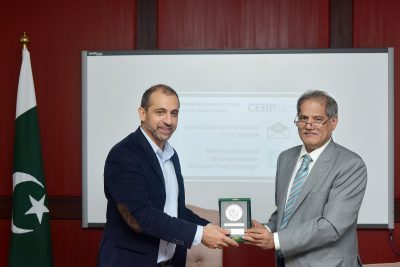
The Pakistan Institute for Parliamentary Services held an interactive session on “Data and Analytics for Policy Success,” on Wednesday, 12th July 2017 under the auspices of Professor Dr. Asim Ijaz Khwaja. The session was attended by researchers from both National Assembly and the Senate, along with joint secretaries, debate editors as well as several members of the PIPS team. Dr. Asim Ijaz Khwaja is a Professor at the Harvard Kennedy School and a board member at the Center for Economic Research Pakistan (CERP).
The session began with introductory remarks by Senior Research Officer PIPS, Tehseen Khalid, followed by the recitation of verses from the Holy Quran. The Executive Director PIPS, Mr. Zafarullah Khan then welcomed Dr. Asim Ijaz Khwaja and his team to PIPS expressing his excitement to listen to his ideas and expertise regarding data and analytics. He emphasized the need to acquire this skill as crucial.
Dr. Asim began the session by asking the audience to briefly introduce themselves. He then introduced CERP and Evidence for Policy Design (EPoD) to the audience. Dr. Asim pointed out that it is necessary for every decision to be based on information and conclusive evidence for it to be effective. We cannot make decisions void of data which surrounds us in abundance. He informed the audience that in today’s and age one cannot avoid data; 90% of the world’s data has been generated in the past two years. This abundance of data has significantly altered the manner in which policies are made. Two ways in which the practice of informed evidence based decisions can be made common is firstly, by training (the civil society, media, academia, politicians and parliamentarians) and secondly, forming active collaborations and partnerships.
Dr. Asim mentioned that today the definition of “smart” has evolved from acquisition of knowledge to an individual or an organization that continues to learn, experiment and adapts frequently. Hence those institutions flourish which continuously evolve and maintain a certain level of curiosity. He pointed out 3 ways in which we can get our institutions and organizations to behave in a smart manner: be open to new data, use theory to organize data and use data to test and refine existing theories. He emphasized the need to build and manage a learning organization. For this he informed the audience of the SPDI approach which involves 5 stages: identify, diagnose, design, implement and test and refine. He concluded the talk by encouraging the audience to adapt to new data and avoid the practice of staying stagnant and fixated in what we already know. He also advised the audience to be problem driven rather than solution driven by digging deep into the roots of the problem and developing long term solutions.
The talk was followed by a question and answer session in which the audience actively engaged with the guest speaker. Executive Director PIPS, Mr. Zafarullah Khan thanked the guest speaker for imparting his expertise and for his time. The session concluded with the Executive Director PIPS presenting Dr. Asim Ijaz Khwaja with a token of appreciation.